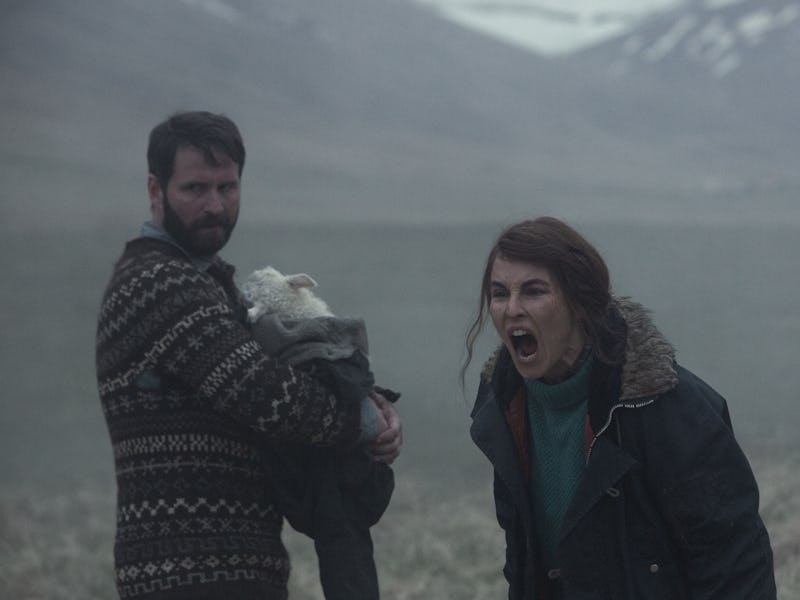Lamb review: A24's gorgeous new horror is its weirdest movie to date
Explorations of grief, denial, and parenthood define Valdimar Jóhannsson’s freshman effort distributed by A24.

Valdimar Jóhannsson knows you want to see it.
Centered on the birth of a bizarre human-sheep baby raised by lonely farmers, the filmmaker’s freshman effort asks a simple, consciousness-stalking question: “What does that demon baby look like?”
A mad genius, a methodical torturer, or some combination, Jóhannsson knows when (and how) to stage this reveal. And he makes sure you’ll keep watching past that, to the bitter end.
Lamb, the newest creature feature distributed in the U.S. by famed indie studio A24, is a folk story combined with a minimalist drama, which succeeds on its strange wavelength as a cautionary tale of sorts.
With a tonal range that leans towards the comedy side of the horror-comedy spectrum, Lamb is a one-of-a-kind work of art that muses, however strangely, on parenthood and man’s relationship to nature. Amidst breathtaking wide shots of rural Icelandic farmland, a horde of ideas crowd for attention, with one standing apart from the herd: Nature isn’t evil, but it will strike with fury against those who exploit it for personal gain.
Noomi Rapace stars in Lamb, directed by Valdimar Jóhannsson.
Noomi Rapace, best known for her roles in Prometheus and the original Swedish-language Girl with the Dragon Tattoo films, stars as Maria, a sheep farmer who with husband Ingvar (Hilmir Snaer Gudnason) delivers a lamb with science-defying physiology.
You never see “Ada” in full, at least for a long while, as they wrap her in blankets. But Maria and Ingvar’s shared expressions of shock and speechlessness say plenty. Filling a void in their hearts, the two raise the lamb, Ada, as their own. What follows are bath times, living-room dance parties, and long handheld walks in front of gorgeous green hills.
Something is terrifying at the end of this scenic avant-garde story. But Jóhannsson is less concerned with delivering the usual horror thrills as he is with orchestrating the melodrama of a family wracked with pain and grief.
Lamb has all the makings of a slasher, especially with its nightmarish final reveal. But a generous peppering of tiny, often funny moments lends Lamb an identity that’s hard to sum up accurately. As everyone from a house cat to Ingvar’s visiting brother Pétur (Björn Hlynur Haraldsson) struggle to make sense of Ada, you can imagine Johansson snickering behind the camera and having fun with subverting audience expectation.
Rapace is one of Lamb’s two best assets, imbuing Maria with remorse, denial, and rage. Given sparse dialogue, Rapace communicates the full range of Maria’s complexities as a fiercely protective mother of a child that, safe to say, isn’t her own. Gudnason accompanies Rapace as an equally hapless husband, sacrificing a modicum of sanity for familial bliss.
Hilmir Snaer Gudnason, and Noomi Rapace, in Lamb.
The other asset is Jóhannsson’s direction and writing, a collaborative effort with poet Sjón. Jóhannsson calculates his camera movements. Partnered with cinematographer Eli Arenson, the director frames Ada like one would a human child. (In case you’re wondering, as I did, ewe lambs age fast, maturing at six months. About that much time passes in the film.)
The filmmakers are also alive to their natural surroundings, transforming this stretch of Iceland into something between paradise and purgatory. Save for a prologue set at Christmas, there’s never a dark night in Lamb. Welcome to Iceland. While this is an actual climate, the overwhelming grays and dull greens and blues paint a portrait of spiritual desperation, an eternal restlessness that allows even an unholy thing to look like a ray of salvation.
Jóhannsson rarely delivers any explicit Christian imagery, hough sheep and their subfamily relatives, goats, have been metaphors for Christ and the anti-Christ for thousands of years. Such ideas are at best implied. And it’s not quite hell in this remote corner of the world; the view is calendar-worthy.
But the film’s setting is maddeningly isolating. When we meet Maria and Ingvar, their shared sorrow is so potent you can almost smell it. When Ada is born, you instinctually understand why they don’t run from what they see, nestling it in a warm blanket.
Buoyed by unexpected humor and an impeccable sense of the natural lands surrounding its characters, Lamb defies expectations in beautiful and potentially frustrating ways. It’s a horror movie without heart-stopping scares. It’s a family drama with one disturbing resolution. As a cautionary tale, it warns against stealing from nature and making sure desperation never clouds judgment.
Jóhannsson knows you want to see how a demon sheep-baby looks. The reveal comes fast and abrupt when you least expect it, and that decision echoes one fact of life faced by the characters. You’re never truly prepared for what life throws at you. Denial is a hell of a thing, and if you’re not careful, it’s powerful enough to lead you astray.
Lamb opens in theaters on October 8.
This article was originally published on